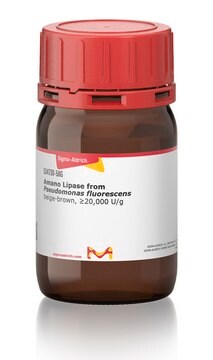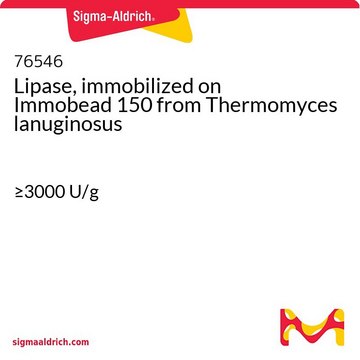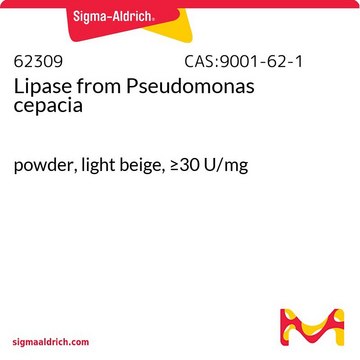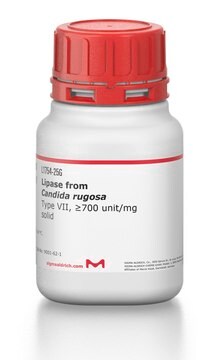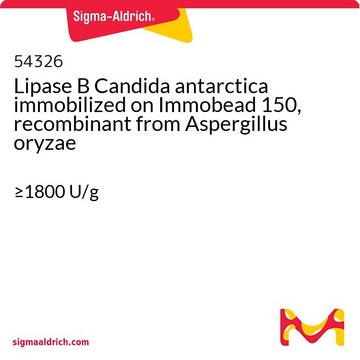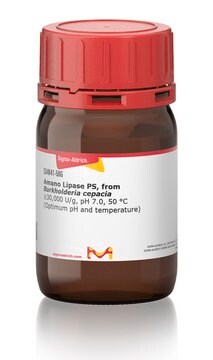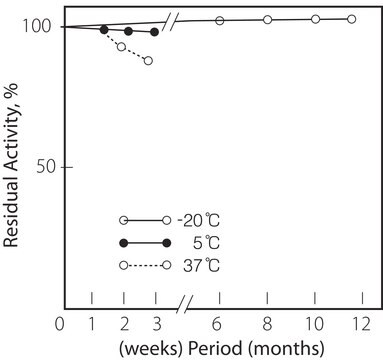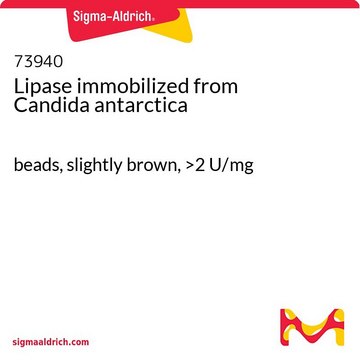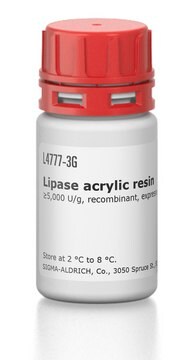54327
Lipase, immobilized on Immobead 150 from Pseudomonas cepacia
≥900 U/g
Synonyme(s) :
Immobilized Lipase
Se connecterpour consulter vos tarifs contractuels et ceux de votre entreprise/organisme
About This Item
Code UNSPSC :
12352204
Nomenclature NACRES :
NA.54
Produits recommandés
Source biologique
bacterial (Pseudomonas cepacia)
Forme
powder (or beads)
Activité spécifique
≥900 U/g
Couleur
white to off-white
Application(s)
life science and biopharma
Température de stockage
2-8°C
Informations sur le gène
Burkholderia spp. ... BURCE16_RS29975(56665765)
Description générale
Research area: Cell Signaling
Lipases are water-soluble, ester hydrolases. Long aliphatic chain acyl esters of cholesterol (cholesteryl esters), triacyl esters of glycerol (triacylglycerols), acyl esters of long chain alcohols (wax esters), diacyl esters of glycerol (diacylglycerols), and monoacyl esters of glycerol, are some of the common substrates for lipases.
Lipases are water-soluble, ester hydrolases. Long aliphatic chain acyl esters of cholesterol (cholesteryl esters), triacyl esters of glycerol (triacylglycerols), acyl esters of long chain alcohols (wax esters), diacyl esters of glycerol (diacylglycerols), and monoacyl esters of glycerol, are some of the common substrates for lipases.
Application
Lipases are used industrially for the resolution of chiral compounds and the transesterification production of biodiesel.Lipase, immobilized on Immobead 150 from Pseudomonas cepacia has been used in enzymatic hydrolysis of polylactic acid (PLA). It has also been used as biocatalysts in lipase-catalyzed kinetic resolution reactions.
Actions biochimiques/physiologiques
Lipases catalyze the hydrolysis of triacylglycerols into glycerol and free fatty acids.Lipases are known to regulate energy metabolism of the cell. Lipolysis is highly essential for cellular uptake or release of fatty acids (FAs) and glycerol. Gastrointestinal lipolysis catabolizes dietary fat. Vascular lipolysis hydrolyzes lipoprotein-related triglycerides (LTPs) in the blood. In the intracellular domain, lipolysis catalyzes the breakdown of triglycerides (TGs) stored in LDLs for exportation of fatty acids (fat) (fat tissue) or metabolism (non-adipose tissue).
Définition de l'unité
1 U corresponds to the amount of enzyme which liberates 1 μmol butyric acid per minute at pH 7.5 and 40°C (tributyrin, Cat. No. 91010, as substrate)
Code de la classe de stockage
11 - Combustible Solids
Classe de danger pour l'eau (WGK)
WGK 3
Point d'éclair (°F)
Not applicable
Point d'éclair (°C)
Not applicable
Équipement de protection individuelle
Eyeshields, Gloves, type N95 (US)
Faites votre choix parmi les versions les plus récentes :
Déjà en possession de ce produit ?
Retrouvez la documentation relative aux produits que vous avez récemment achetés dans la Bibliothèque de documents.
Les clients ont également consulté
Florian Golombek et al.
ACS omega, 6(43), 29192-29200 (2021-11-09)
Deracemizations are clearly preferable to kinetic resolutions in the production of chiral molecules from racemates, as they allow up to 100% chemical and optical yield. Here we present a new process route for multienzymatic deracemizations that is relevant for reaction
Song-Hua Hu et al.
Cell reports, 38(11), 110509-110509 (2022-03-17)
Protein fatty acylation regulates numerous cell signaling pathways. Polyunsaturated fatty acids (PUFAs) exert a plethora of physiological effects, including cell signaling regulation, with underlying mechanisms to be fully understood. Herein, we report that docosahexaenoic acid (DHA) and eicosapentaenoic acid (EPA)
Guan-Chun Chen et al.
Biotechnology letters, 33(3), 525-529 (2010-11-04)
Triacylglycerol lipase from Pseudomonas cepacia and Fe(3)O(4) magnetic nanoparticles were encapsulated simultaneously within biomimetic silica through the catalysis of polyallylamine. The encapsulation efficiency reached 96% with an activity recovery of 51%. After 5 h at 37°C, the activities of the
Industrial applications of microbial lipases
F. Hasan et al.
Enzyme and Microbial Technology, 39, 235-251 (2006)
Notre équipe de scientifiques dispose d'une expérience dans tous les secteurs de la recherche, notamment en sciences de la vie, science des matériaux, synthèse chimique, chromatographie, analyse et dans de nombreux autres domaines..
Contacter notre Service technique
